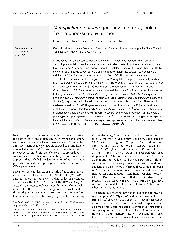摘要
A taxonomic study was carried out on strain B142(T), which was isolated from a crude-oil-degrading microbial consortium via enrichment with deep water from the Indian Ocean. Cells of the isolate were Gram-negative, oxidase-negative, catalase-positive, helical in shape, motile by means of polar flagella (three per cell) and moderately halophilic. Growth was observed at salinities of 0.5-12% and at temperatures of 10-41 degrees C. The micro-organism was capable of denitrification, but was unable to degrade Tween 80 or gelatin. The predominant fatty acids were C(16:1)omega 7c and/or iso-C(15:0) 2-OH (6.4%), C(16:0) (15.7 %), C(18:1)omega 7c (45%), C(18:0) (6.8%) and C(19:0)omega 8c cyclo (6.7%). The G+C content of the chromosomal DNA was 67.3 mol%. Comparisons of 16S rRNA gene sequences showed that strain B142(T) was most closely related to the type strains of two Insolitispirillum peregrinum subspecies (93.0-93.1% sequence similarity), two Novispirillum itersonii subspecies (92.8-92.9%) and Caenispirillum bisanense (91.7%); sequence similarities with respect to other taxa were below 90.5%. Phylogenetic analyses based on 16S rRNA gene sequences showed that strain B142(T) formed a distinct evolutionary lineage within the family Rhodospirillaceae. Strain B142(T) was distinguishable from phylogenetically related genera with regard to several phenotypic properties. On the basis of phenotypic and phylogenetic data, therefore, strain B142(T) represents a novel genus and species, for which the name Marispirillum indicum gen. nov., sp. nov. is proposed. The type strain is B142T (=CCTCC AB 208225(T)=LMG 24627(T)=MCCC 1A01235(T)).
- 出版日期2009-6
- 单位国家海洋局第三海洋研究所
